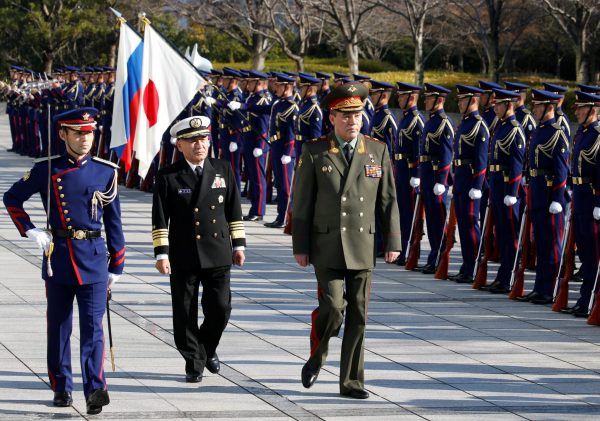Russian President Vladimir Putin has a history of humiliating Japanese Prime Minister Shinzo Abe, most famously by keeping Abe waiting for hours in advance of a bilateral meeting. The news of Russian military exercises being held on Northern Territories Day is just the latest example of this sort of behaviour.
Though Russia is keen to ensure that Japan looks like the supplicant in their relationship, Moscow too is frustrated by the lack of progress in its relationship with Tokyo. Putin has held 20 meetings with Abe in recent years, yet Russia and Japan’s relationship barely extends beyond these diplomatic exchanges. There is an obvious strategic logic to better ties: Japan fears China’s rise, while Russia risks becoming overly dependent on China with no partners besides Beijing.
Why then, despite the flurry of diplomatic activity and presidential summits, can Japan and Russia not deepen their relationship? There are numerous reasons, which range from domestic political concerns to international security. But the two countries’ failure to develop economic ties stands out as an enduring roadblock to deeper political relations.
The security challenges standing between better Russia–Japan ties are straightforward. Tokyo depends on Washington for security guarantees not only vis-a-vis an increasingly well-armed North Korea but also vis-a-vis a rising China. With a medium-sized military and no nuclear weapons, Japan requires US defence commitments for its security. Tokyo is therefore wary of angering Washington by improving ties with Russia amid a broader US–Russia clash.
Further, while Japan feels more secure with a stronger US security presence in Asia, Russia sees US military build-up as a threat. This dynamic was visible recently as Japan bolstered its missile defence cooperation with the United States in response to North Korean missile tests. The Kremlin protested that new US–Japan missile defence programs threaten Russian security. So long as the two countries have such divergent views of US military presence in Asia, security matters will present a roadblock to broader cooperation.
Even putting these different views on Northeast Asian security aside, Japan and Russia have little that is pushing them together. Domestic politics in both countries remains largely disinterested in the other and Japanese businesses demonstrate little interest in investing in their northern neighbour despite a decades-old hope from Russia.
This lack of business interest in the Japan–Russia relationship obstructs improved relations in two ways. First, it ensures that neither country has a powerful domestic lobby pushing for better ties. Second, the lack of Japanese investment in Russia removes one of the main rationales for Moscow to seek better ties: business. Russian politicians have repeatedly spoken about the prospect that Japanese investment might help modernise the country’s Far East. After three decades of rhetoric, it is now clear that a surge of investment is unlikely. There is thus no economic reason for Russia to seek better ties with Japan, since the countries’ firms are not interested in investing in any significant magnitude.
Given the proximity of Russia’s Far East to Japan and the region’s urgent need for investment, the lack of business interest might seem surprising. Why do Japanese firms not want to invest? Former Soviet leader Mikhail Gorbachev tried to attract Japanese investment as early as the late 1980s, but amid the collapse of the Soviet Union there was little interest. In the 1990s, Russia’s economy was far from stable. High inflation and chaotic economic policy made investment risky. These problems of macroeconomic stability have been mostly resolved since Putin took power in 1999, and yet there is still no significant increase in Japanese investment.
In 2016 (the most recent year for which there is complete data), Japanese firms accounted for 0.2 per cent of foreign direct investment (FDI) in Russia. Over the past decade, there is only one year in which Japan accounted for more than 2 per cent of Russia’s total FDI inflows. Trade flows are also mostly constant when controlling for commodity price swings. Estimates of Russia’s non-oil and gas exports to Japan suggest that the current level is only slightly higher than it was a decade ago, and they are down significantly since 2012. When commodity price swings are included, the collapse in Russian exports to Japan over the past five years looks dramatic.
Given stagnant Japanese imports from and limited Japanese investment in Russia, Moscow sees little economic opportunity in the relationship. So long as Russia’s business environment remains unfavourable to foreign investors — something that with few exceptions has proven a feature of ‘Putinomics’ since its inception — Japanese firms are unlikely to change their calculus. Even if the strategic situation proved more favourable for Japan–Russia rapprochement, there are no economic factors driving the two countries together.
Chris Miller is Assistant Professor at The Fletcher School of Law and Diplomacy, Tufts University, and is the author of Putinomics: Power and Money in Resurgent Russia.


Something alluded to but not clearly noted in this analysis might also explain the lack of progress in Japanese-Russian relations. Putin’s autocratic, arrogant manner in which he interacts with Abe does not promote goodwill, let alone trust. Keeping Abe waiting for hours before finally meeting with him is an insult.
Neither does Putin make it easier for Japanese companies to invest in its Siberian Far East, let alone the rest of Russia. There is little incentive for them to do so.
Finally, it should be clear to Abe, or anyone else aware of Putin’s behavior towards Ukraine , that Putin has no intention of giving up any territory. Abe is chasing after a pipe dream if he expects to get any of the four islands back.